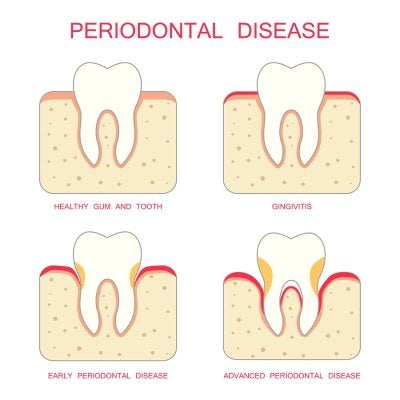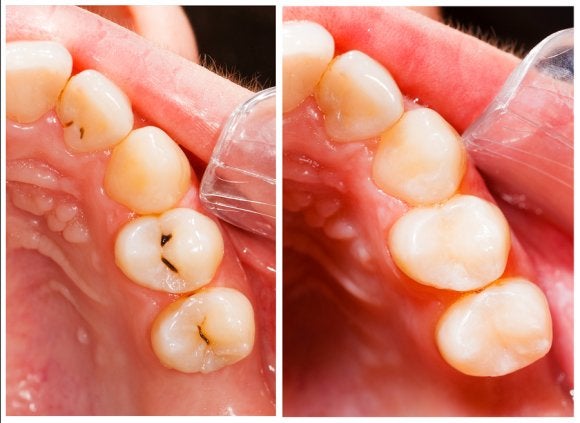-
The Oral Health Risks of Tobacco Use
Using tobacco products, including cigarettes and smokeless tobacco, can severely impact your oral health. As your dentist can explain, tobacco use dries out your mouth, decreasing the natural production of saliva. Saliva acts as a cleansing agent in the mouth, removing harmful bacteria that can cause plaque, tartar, and gum disease. The next time you visit your dentist in Bel Air , ask about the dangers of tobacco use.
Watch this video to learn more about the oral health risks associated with tobacco use. In the video clip, a dentist from the American Dental Association discusses how tobacco use increases your risk of developing infections, gum disease, tooth loss, and oral cancer.
-
Why It’s Important to Treat Gum Disease
Gum disease, or periodontal disease, is caused by poor dental hygiene. When plaque builds up on your teeth and hardens into tartar, it harbors harmful, dangerous bacteria. If not treated by a dentist or periodontist, this bacteria eventually causes gum disease. If you’re concerned that you might be suffering from gum disease in Bel Air , visit a dentist near you for treatment as soon as possible. Keep reading for information about why it’s important to treat gum disease.
Avoid Receding Gums
 If left untreated, the early, milder symptoms of gum disease will quickly progress into much more serious dental problems. Gum disease causes your gums to become inflamed, tender, and red. They will bleed easily, making you very susceptible to oral infections. Your gums will also begin to recede. If you visit a dentist regularly, or visit a periodontist at the first sign of gum disease, you can avoid developing receding gums.
If left untreated, the early, milder symptoms of gum disease will quickly progress into much more serious dental problems. Gum disease causes your gums to become inflamed, tender, and red. They will bleed easily, making you very susceptible to oral infections. Your gums will also begin to recede. If you visit a dentist regularly, or visit a periodontist at the first sign of gum disease, you can avoid developing receding gums. Prevent Tooth Loss
As gum disease continues to infect your gums and tissues, the gums will begin to pull away from the teeth. This causes spaces, or pockets, to form between the teeth and gums. These pockets are very vulnerable to infection, as it’s easy for bacteria and food to get trapped inside them. While the body’s immune system fights the bacterial infection, the bone and connective tissue that hold the teeth in place will begin to break down. If an emergency dentist or periodontist doesn’t intervene, you may eventually suffer from tooth loss.Decrease Your Risk of Developing Other Health Problems
The longer gum disease is left untreated, the more severe it becomes. Because it’s a very serious infection, it can spread to other parts of your body through your bloodstream. Your immune system will continue trying to fight the infection, which will tax your body’s resources, making you feel weak. If a dentist doesn’t treat gum disease, the infection can increase your risk of developing very serious health problems. Due to your weakened immune system, you will be much more susceptible to cardiovascular disease, diabetes, respiratory disease, and certain types of cancer. -
The Uses of Composite Fillings
Composite fillings are used in emergency dentistry, general dentistry, and cosmetic dentistry to restore and repair teeth. Composite fillings are created from a mixture of plastic and glass. They are tooth-colored, making them appear very natural and almost unnoticeable when used to repair a tooth. If your tooth is damaged, visit a dentist near you in Bel Air and ask about composite fillings.
If a tooth is cracked, damaged, chipped, or broken due to decay or trauma, your dentist may recommend removing the damaged portion of the tooth, and replacing it with a composite filling. The composite filling is applied to the tooth in layers, and a special light is used between each layer to harden it. After the filling is complete, the dentist shapes the composite to naturally fit the tooth and match surrounding teeth.
Composite fillings are often used because they look so natural. Your dentist can blend different shades together to perfectly match the natural color of your tooth. Composite fillings also bond to the remaining portion of the tooth, supporting its structure. This protects the tooth from further damage, and insulates it from sensitivity caused by temperature fluctuations. If a damaged tooth is left untreated, more significant treatments, such as root canal therapy, may become necessary.

-
An Inside Look at Root Canals
A root canal procedure is a method used by general and emergency dentists to save a tooth that has been infected due to decay or trauma. Root canal therapy is an alternative to undergoing a tooth extraction and then having to receive a dental implant or dentures to replace the missing tooth. If you’re in need of a root canal in Bel Air , keep reading to learn more about the procedure.
Why Root Canals Are Necessary
A root canal procedure is necessary if the tooth’s nerve is infected, or if the dental pulp is damaged. When this infection or damage occurs, the nerve root and pulp begin to break down, allowing bacteria to multiply in the pulp chamber. This bacteria can even cause an abscessed tooth. It can also lead to bone loss, drainage problems, or swelling in the face, neck, or head.
bacteria can even cause an abscessed tooth. It can also lead to bone loss, drainage problems, or swelling in the face, neck, or head. What Symptoms Indicate an Infection
If you’re suffering from an infected nerve root or damaged pulp, there may be a few obvious signs and symptoms that you’ll notice. You’ll experience a severe toothache, or intense pain when biting, chewing, or grinding. Your infected tooth will be extremely sensitive to hot and cold temperatures, even when the stimulus is removed. The gum tissue around the infected tooth will become tender, sensitive, inflamed, and swollen. You may notice that the infected tooth has become discolored, or appears darker than surrounding teeth.How a Root Canal Procedure Is Performed
A dentist or endodontist can perform a root canal procedure in the dental office. Your dentist will first take X-rays of your teeth to see how far the infection has spread. You’ll then be given local anesthesia. Your dentist will drill a hole into the infected tooth, through which he’ll remove the decayed nerve root, damaged dental pulp, and any other debris. The tooth is then thoroughly cleaned, injected with medication and antibiotics, and sealed with sealer paste and a rubber compound. Your dentist may recommend that a dental crown be placed on the tooth to further protect it.
categories
- Uncategorized
- General Dentistry
- Toothache
- Emergency Dentistry
- Family Dentistry
- Receding Gums
- Cosmetic Dentistry
- Veneers
- Gum Disease
- Gingivitis
- Dental Crowns
- Orthodontics
- Dental Implants
- Root Canal
- Wisdom Teeth
- Teeth Whitening
- Your Smile
- Composite Fillings
- Lumineers
- Dentures
- Invisalign
- BrightSmile
- Dental Bridge
- Abscessed Tooth
- Sealants
